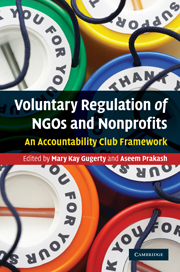Book contents
12 - Conclusions: nonprofit accountability clubs
from Future research and conclusions
Published online by Cambridge University Press: 10 November 2010
Summary
Nonprofits and nongovernmental organizations (nonprofits, in short) have emerged as important actors across a wide range of policy areas. Along with their contribution to economic growth and democracy (Putnam, 1993), some view them as the key pillars of the emerging world society (Meyer et al., 1997) and world culture. Given their policy potential and the policy hype that has often surrounded them, nonprofits have attracted significant levels of resources from governments, intergovernmental organizations, foundations, citizens, and corporations. The expectations for what nonprofits can accomplish are quite high, especially given the inadequate success of both market-based and government-based approaches in solving pressing policy problems.
This increased policy attention and the attendant rise in resource flows to the “third sector” have also led to increased scrutiny. Both practitioners and scholars have raised questions about the lack of appropriate accountability mechanisms to govern nonprofits: if nonprofits are showered with resources, how do we know whether nonprofits are delivering as promised? Nonprofits, as well as the donors that seek to fund them, have sought to address these accountability demands in several ways. This volume examined one important category of accountability mechanisms: voluntary accountability clubs. Theoretically and empirically, this volume explored issues such as how and why such clubs emerge, why nonprofits are willing to participate in voluntary programs that impose costly obligations, who sponsors these programs, and how participation in such clubs might reassure various principals about nonprofits' intentions regarding accountability and governance issues.
- Type
- Chapter
- Information
- Voluntary Regulation of NGOs and NonprofitsAn Accountability Club Framework, pp. 283 - 302Publisher: Cambridge University PressPrint publication year: 2010



